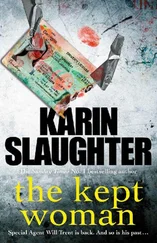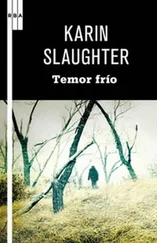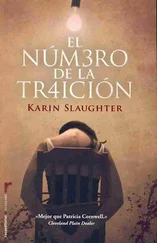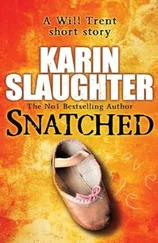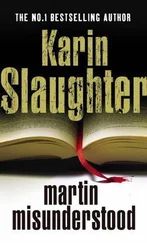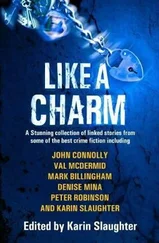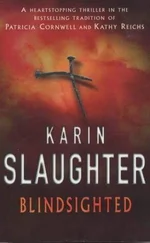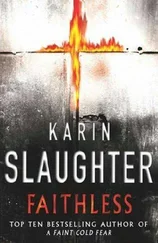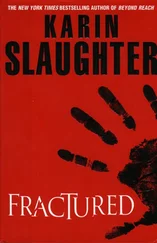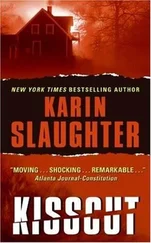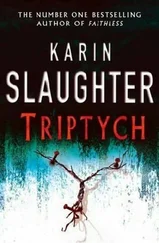As I’ve been outlining the plot for Indelible , the fourth Grant County novel, I’ve realized a lot of things about Sara that I never knew before — and this is kind of funny, because Indelible takes place in the past, around the time Jeffrey and Sara first get together. Sara has always been the moral center of the series. Jeffrey and Lena work outside the lines a bit, but Sara sees right and wrong very clearly. There’s something in Indelible that lets you know she’s bound by rules for a reason.
We also get a lot of history on Jeffrey, and why he moved to Grant County in the first place. As for Lena, we get to see her with Sibyl and I think seeing Lena so unguarded with Sibyl will tell us a lot about her character. I say “us” because it will be a learning process for me, too.
Laura Lippman:It sounds like you were plotting your fourth book while writing your third.
Karin Slaughter:It’s a curse — I’m always more interested in the next book.
Laura Lippman:This begs some question about process — writing and thinking. How big a canvas are you working on?
Karin Slaughter:The earlier books are sketching out the lines of the characters. The later books will add more detail and color.
I have always loved mysteries and thrillers. I remember reading my first Encyclopedia Brown when I was a kid. I drove my parents nuts wanting to go to the library and check out the rest of the series. When I first wrote about Grant County, I wanted to write the type of books that I would enjoy as a reader. First and foremost, I wanted the characters to grow and change like people do in real life.
Throughout the series, we see the evolution of Sara and Jeffrey’s relationship as well as Lena dealing with the loss that she experienced in the first novel. I feel a responsibility toward my characters, and I did not want them to go from book to book without learning something from their experiences. They’re also going to age, which rarely happens in series books.
I think of Blindsighted as an introduction to all the characters and to the town. Kisscut is more about Lena, while A Faint Cold Fear focuses on Sara and her family. Indelible , the fourth book, is about Jeffrey. I’ve also got a solid idea for a fifth book, but I’m waiting to get fully through three and four before I let myself pick the meat off those bones.
Laura Lippman:Second books — sophomore efforts, to use a dreadful term — have a reputation for being extremely tough. Was that your experience with Kisscut ?
Karin Slaughter:I think that worrying about the sophomore slump can be debilitating for a lot of authors, and they can lose sight of why they started writing in the first place. Writing is such a solitary craft, and most of the time it’s just you and your computer. When you are a published author, it’s not just you anymore. It can be distracting thinking about reviews and tours and sales and all those things that have nothing to do with writing stories. After a while, it’s like being nibbled to death by ducks.
When I started Kisscut , there was so much going on with Blindsighted that I took a week in Florida to be alone with the characters again and work on the story. As important as the first novel is, the second one proves you’ve got more than one book in you. I tried not to think about that part of it when I was writing, just as I tried not to think about the pressure on Kisscut while writing A Faint Cold Fear . Basically, I guess my life is one of healthy denial right now.
Laura Lippman:Do you think you have a finite number of books in you?
Karin Slaughter:You’ve picked a bad time to ask. Every time I finish a book, I think that’s my last and I’ll never be able to write again. I suppose it goes back to the love-affair analogy, where once you’ve gotten rid of someone, you think you’ll never fall in love again. Of course, you always do, and I’ve found myself over the last few days thinking about a couple of things that Sara and Jeffrey might find interesting.
So, thankfully, the feeling that I’ve written my last book never lasts long. One night I’ll go to bed thinking I’ll never get another contract and that I’m going to end up working at Home Depot next year (which was actually a dream job of mine at one point) but then I’ll wake up the next morning and there will be all sorts of notes I’ve written in the middle of the night and left out on the kitchen counter. Then I’ll start working an idea around in my head and won’t be able to rest until it’s on the page. For now, though, I feel drained and useless, like I should be in the Keswick Home for Incurables.
Laura Lippman:Keswick Home for the Incurables! You sly girl — have you read The Last Place ? Because Kisscut is on my bedstand, on hold until I’ve finished #8. I cannot read crime fiction at certain points in the process, so I’ve been reading other things. Girlie things, well-mannered novels.
Karin Slaughter:I had to read The Last Place in pieces, because I started working on A Faint Cold Fear and had to stop reading. I’m like you — I can’t read crime fiction when I’m writing. [In The Last Place] Keswick is right where I had to break off reading your book. Fortunately, I had to go to New York last week and took it with me on the plane. Unfortunately, we taxied on the runway forever, so I finished it before we even got into the air. The woman next to me was reading E. Lynn Harris’s latest, and I kept trying to look over her shoulder but she gave me a really nasty look.
Laura Lippman:Is it just me or is there a sameness of voice in first-person women’s fiction that Aspires to Seriousness? I won’t name names, for I do admire these books, and the one I’m reading right now is quite good.
Karin Slaughter:I wonder, does anyone ever ask if there is a sameness of voice in first-person men’s fiction? Are they all held up in the minutiae of language, the stretch to seem like the ultimate insider while maintaining the appearance of being the cool, misunderstood outsider? (Sensitive enough to know poetry yet manly enough not to quote it to anyone but a woman.)
I don’t really read so-called chick lit. I guess the sameness of voice is a primary reason, but another, bigger reason is that I think the issues being tackled in women’s fiction are so much better handled in crime fiction. Denise Mina, Mo Hayder, you, and I would hope I, are all doing much more interesting things with voice and narrative in our books than those-we-will-leave-unnamed women’s fiction writers.
Some of the best books I’ve read lately make powerful statements about sex, violence — violence against women — and social issues affecting women, and all of them fall into the crime fiction category. The best part is that crime novels actually have a plot. A lot of “literary” novels don’t have plots anymore. I don’t think someone should have to die for this to happen in literary fiction.
Laura Lippman:The “women’s fiction” I mentioned wouldn’t be called chick lit, the best of which is riotous and funny. I was talking about the serious stuff, or wannabe-serious stuff. And most reviewers wouldn’t be as sexist as I am, but there is a voice out there, this well-mannered, polite, so much the-girl-in-the-front-row voice that I can’t help noticing it. Somewhere, young women are being rewarded for writing this way — and I’m not sure they should be. There’s probably an analogous young man’s voice as well, but I haven’t identified the strain yet. On the plus side, there is no shortage of mainstream female writers with unique voices — Alice Adams, Laurie Colwin, Cathleen Schine.
Читать дальше

